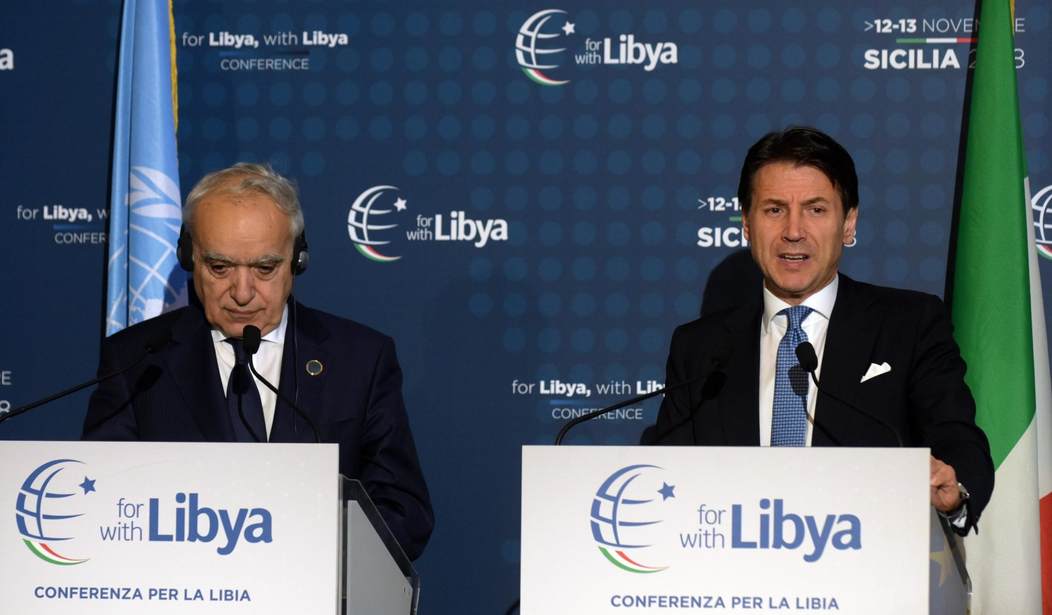On November 13, a Turkish delegation including Vice President Fuat Oktay withdrew from a two-day international conference in Palermo, Italy, which had been organized to discuss the crisis in Libya. The delegation withdrew on the grounds that Turkey had not been included in an unofficial meeting.
About Turkey’s decision, Oktay issued a written statement which said, in part:
It is impossible for the countries which are responsible for the current difficult situation in Libya to make any positive contribution to the fixing of the country.
He was apparently referring to some Western countries, such as the organizer of the conference, Italy. But is he right? Are Western powers “the evil doers” in Africa? Or could other factors be responsible for Libya’s chaos? A brief historical account of the country could help us better understand what has gone wrong.
Ancient Libya: A Roman-Greek Country
Although Libya is an Arab Muslim country today, it had a deep-rooted Roman, Greek, and Christian history prior to the Seventh Century Islamic conquest.
The Amazigh (Berbers) are believed to have been the original inhabitants of Libya. From the Seventh to the Fourth Century BC, peoples such as the Phoenicians, Greeks, Persians, and Carthaginians settled in the region.
In 74 BC, Romans conquered Libya and incorporated the region into the Roman Empire. Roman and Greek emperors rebuilt and adorned magnificent cities there. The ancient Roman city of Leptis Magna, for instance, still contains some of the world’s finest remains of Roman architecture. The ancient Greek city of Cyrene in northeast Libya “grew to become one of the greatest intellectual and artistic centers of the Greek world, most remarkable for its medical school, its learned academies and its superlative architecture,” write scholars Jason Morgan, Toyin Falola, and Bukola A. Oyeniyi in their book Culture and Customs of Libya.
They add that, under Roman rule, “Many Berbers converted to Christianity … North Africa, including Libya, became one of the leading centers of early Christianity. Before Emperor Constantine made Christianity an accepted religion in the early fourth century, it had already been accepted by the Roman authorities in North Africa.”
By the middle of the Fifth Century, the Vandals — an East Germanic group — conquered north Africa. Their rule in Libya ended in 534, when Emperor Justinian reconquered the region and re-incorporated it into the Eastern Roman Empire, later called Byzantine.
In the Seventh Century, a major threat emerged in the form of Islam, founded by Muhammad in Mecca in 622. Early Muslim armies began their assault on the Christian Byzantine Empire by storming into Syria. In 643, Arab Muslims under Amr Ibn al-As invaded Byzantine Libya and started spreading Islam there. During the Arab rule, a caliphate headed the region and acted as both the king and religious leader.
By the end of the Seventh Century, Christian Byzantines lost Syria, Israel, and Egypt, among other lands, to Islamic invaders. Their raids resulted in the Islamic invasion of half of the known world.
Arab caliphs continued the invasion of non-Muslim neighboring states, attacking Sicily (today’s Italy) and Asia Minor (today’s Turkey, then Byzantine Empire). In 664, Afghanistan, which was then majority-Buddhist, fell to the invading Muslim armies. Early jihadist armies also engaged in sea raids ranging from Rhodes to the Iberian Peninsula. By the early Eighth Century, all of North Africa was under the control of the Arab caliphate, turning the Islamic empire into one of the largest empires in world history.
In the 16th Century, another Muslim power moved in: The Ottoman Turks took control of Libya in 1551.
“Although Libya had been subjected to invasion and occupation by outsiders throughout its history, it was the Arab invasion in the Seventh Century that had the most long-term impact,” write Morgan, Falola, and Oyeniyi.
“Language and religion were the two most fundamental areas where Arabs had the greatest impact on Libya. Today, most Libyans consider themselves Arabs and Muslims.”
1951: Libyan Independence
The Ottoman rule lasted until the Italian conquest of Libya in 1911. After World War II, Libya got divided into Tripolitania and Cyrenaica (under British administration) and Fezzan (under French administration).
In 1951, Libya became an independent kingdom. In 1969, its monarchy was overthrown by a military junta led by Colonel Muammar Gaddafi.
Gaddafi was a propagandist of Arabization and Islamization. He created a dictatorship inspired by Islamic, pan-Arab, and anti-Western ideas, and systematically used brutal methods of repression. Gaddafi arbitrarily arrested and detained citizens, abducted and killed dissidents in the country and abroad, restricted press freedom and religious liberty, and used torture and other cruel, inhuman, or degrading treatment — among his other crimes.
In 2010, Gaddafi even called to wage jihad against Switzerland and called upon Muslims to boycott Swiss products, airlines, shipping companies, and embassies.
“Switzerland is an infidel and sinful country which destroys mosques. Jihad, with all possible means, should be declared against it,” said Gaddafi, weighing in on the ban on building minarets in Switzerland. He called upon the Muslim masses to head towards all the airports and seaports in the Islamic world to prevent any Swiss plane from landing and any Swiss ship from docking. He called for removing all Swiss products from shops and markets. “If Switzerland were situated on our border, we would fight it,” he proclaimed before a cheering crowd.
Gaddafi defined jihad as “a religious duty”:
Any Muslim anywhere in the world who deals with Switzerland is an infidel against Islam, Muhammad, Allah, and the Koran. Allah said: “Let them find harshness in you.” Instead, they find flexibility and submission in you. You have nothing to do with Islam whatsoever.
He also declared his views on Christianity:
The Christianity of Africa is not really Christianity. This is merely what Colonialism taught them at school. They taught the children some rites, but it has no roots in Africa. Jesus was not sent to Africa. The same goes for Latin America. Spain and Europe conquered Latin America and taught them all this.
Libya was once a flourishing center of African Christianity. Today, it is the seventh-most dangerous country to be a Christian.
According to the 2018 report from Christian advocacy group Open Doors:
Christians in this country are a very small minority, and most are foreigners in search of work or a means of reaching Europe by crossing the Mediterranean … [They] are targets of Islamic militant groups and organized criminal groups that kidnap and sometimes kill with shocking brutality.
Libyan Christians from Muslim backgrounds face extremely violent and intense persecution, constantly pressured by their families and the wider community to renounce their faith.
Libya had also been home to a Jewish community for thousands of years. But according to researcher Sheryl Silver Ochayon, not a single Jew remains there today:
A new law in 1961 required a special permit to prove Libyan citizenship. Virtually all Jews were denied this permit. By 1967 the Jewish population had decreased to 7,000. Following Israel’s Six Day War, antisemitic rioting began again. The King of Libya, as well as Jewish leaders, urged the remaining Libyan Jews to emigrate. An Italian airlift saved 6,000 Jews and relocated them to Rome, though they were forced to leave behind homes, businesses and possessions. In 1969, when Muammar al-Qaddafi came to power, there were only 100 Jews remaining in Libya. His government confiscated all Jewish property, cancelled Jewish debt and made emigration for Jews legally prohibited. Some Jews still managed to get out. By 2004 there were no Jews left in Libya.
Dr. Bill Warner, an author of several books and articles on Islam, explains the phenomenon:
Islam does not reach a balance point with the native civilization; it dominates and annihilates the indigenous culture over time.
This process of total civilizational domination is the Law of Islamic Saturation. The doctrine calls for jihad to never cease until the native population submits to the Sharia. As time goes on, the Sharia brings about submission to Islam. The doctrine is totalitarian, so the result is totalitarian.
Gaddafi even denied the existence of the pre-Arab inhabitants of North Africa, the Amazigh (Berber) people. As part of his Arab nationalist propaganda, he banned Amazigh names, language and script, Tamazight, which is distinct from Arabic. Those attempting to promote Amazigh rights were persecuted, and sometimes even killed.
Although Amazigh people were Islamized over time after the Islamic invasion of their country in the Seventh Century, it appears that being non-Arab was reason enough for the Arab rulers of the country to continue persecuting them.
Gaddafi’s dictatorship was overthrown in 2011 following a popular uprising, leading to prolonged violence and turmoil. Since the death of Gaddafi, Amazigh activists have been openly calling for “their language [to] be given official status and for greater political representation.”
Today’s Situation
The political and security crisis in Libya, now a land of around 6.5 million residents, continues as the state remains divided. Two authorities compete for territorial control: The Tripoli-based, UN-backed Government of National Accord (GNA) in the country’s western regions, led by PM Fayez al-Sarraj; and the Interim Government led by Khalifa Haftar, commander of the Libyan National Army (LNA) forces, based in eastern Libya.
According to the 2017 Human Rights Report by the U.S. State Department:
There were numerous reports that pro-GNA militias, anti-GNA militias, LNA units, ISIS fighters, and other extremist groups committed arbitrary or unlawful killings. … In the absence of an effective judicial and security apparatus, perpetrators remained unidentified, and most of these crimes remained unpunished.
Reports indicated extremist and terrorist organizations, criminal gangs, and militias played a prominent role in targeted killings, kidnappings, and suicide bombings perpetrated against both government officials and civilians. Criminal groups or armed elements affiliated with both the government and its opponents may have carried out others.
If external factors are to be blamed for Libya’s chaos, it would be wiser to blame the Arab and Ottoman occupations and colonialisms which lasted for centuries and did not contribute much to the region culturally or intellectually. The greatest legacy that the Arab and Ottoman caliphates and dictator Gaddafi left for Libya is unending Islamic jihad and violence.
Still, some claim that Western nations should never intervene in the region if they do not want to add fuel to the flames. But for how long can Western nations leave this fire burning boundlessly, neglecting the local and international destruction it causes?
Understanding Libya’s history reveals that the area is in no condition to heal itself. Non-interventionism — or standing idly as brutal dictators or Islamist terrorists spread their disruptive influence over the region — will not magically make the threats dissipate. Stepping in diplomatically, economically, and if needed, militarily, and aiding the fight against destabilizing forces — particularly Islamist terrorists — could help bring positive change in the region.










Join the conversation as a VIP Member